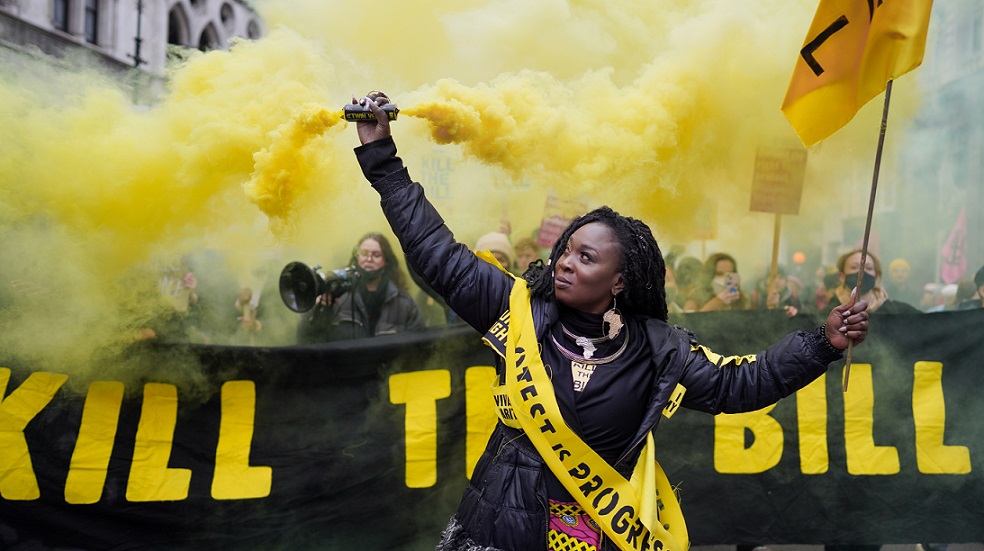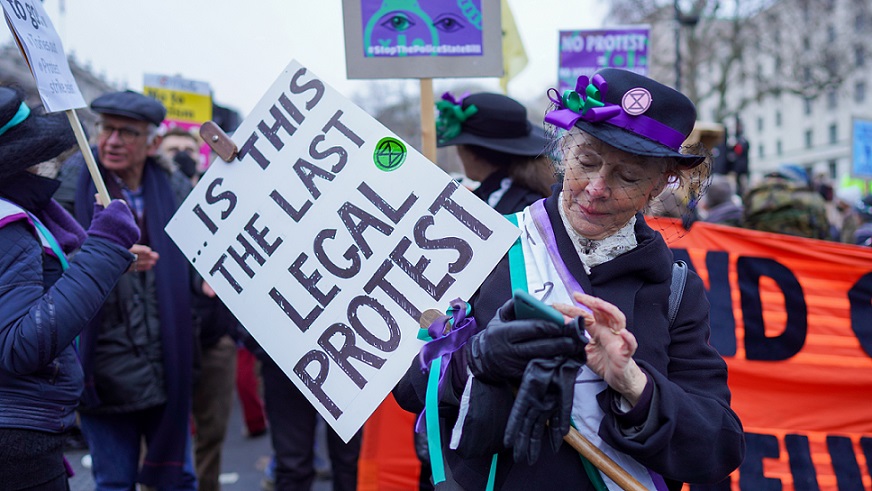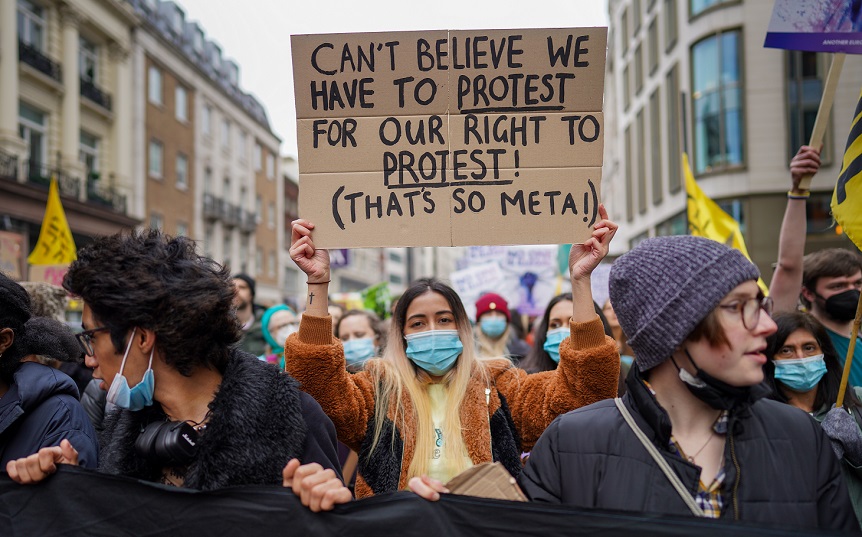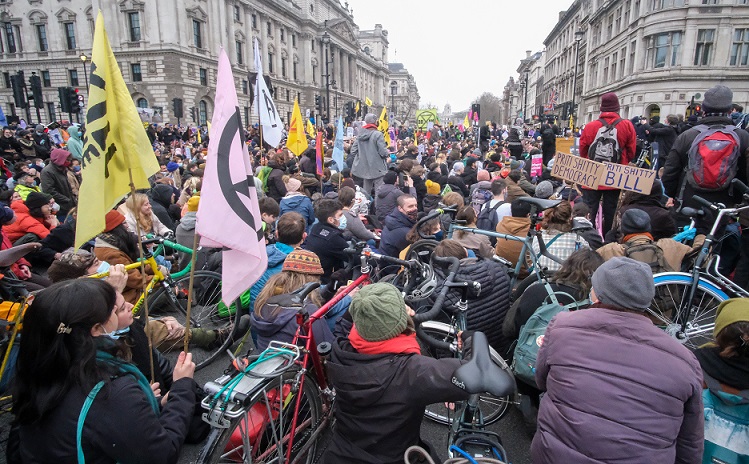After more than a decade of a systemic undermining of the public services, the people are organising massively in the public sphere. To counterattack these movements, the Government has proposed to threaten our freedom with the ‘Public Order Bill’.

Juanjo Andrés Cuervo
The current of discontent that had involved the United Kingdom in recent years erupted dramatically in 2022
‘Kill the Bill’, the University and College Union (UCU) strikes and the protest organised by the National Union of Rail, Maritime, and Transport Workers (RMT), are some of the movements that emerged with force in the last months.
Nevertheless, that was not just a particular moment of one year. It is a symptom of our times. A network of privatisation and underfunding are destroying the consensus.
Across the world, living standards are decaying. And for the UK in 2023 and 2024, the biggest fall in living standards on record for more than sixty years is predicted.
Inevitably, social movements are arising, as people are demanding dignity and better life conditions. It took hundreds of years of struggles to achieve the welfare state, and now it is on the verge of collapse.
The Welfare State: The Western guardian
For the first time in 106 years, the Royal College of Nurses decided to strike in 2022. This is a perfect epitome of the degradation of the NHS, the symbol of post-war Britain.
In the last 15 years, the service has endured the tightest spending settlement in its history. From 1950, health expenditure grew at an average annual rate of 4%, but from 2009 to 2019, it increased by just 1.5% a year.

Created in 1945 after World War Two, it served both to rebuild the country and to save capitalism. The perceived menace of the winds of Communism coming from the East forced leaders to implement the modern welfare state in the Western World.
The literature about this is extensive, including the references in Chris Harman’s “A people’s history of the world” and essays such as How the Cold War helped spur West European welfare state reform or The Cold War and the Welfare State in Western Europe.
It was not the first time that this was done to stop a revolution in its tracks, a concept that Otto von Bismarck invented. In order to stop the advance of the socialists, in 1883, he approved the Health Insurance Law. Thus, Germany became the first modern welfare state.
From 1948 to 1973, the Western world witnessed what was known as the Golden Age. The high levels of employment and the high taxes paid by the rich provided an influx of resources to the state. The K
eynesian model triumphed: there was more money to be invested, the expenditure provided people with the possibility to spend, and the rising consumption levels boosted the economy.
In those years, the middle-class took a significant role during the protests, fulfilling the prophecy of Bakunin. The anarchist had written in the manifesto of 1865 his hopes that, eventually, the privileged youth could adopt the causes of the people. Hence the 1960s student revolts and their alliance with the workers clearly illustrated during the French May of 1968.
But in 1973, the falling of dusk brought a long night.

Thatcher’s motto TINA (‘There is no Alternative’) epitomised the new era. The oil crisis shifted the economic paradigm, and the coup against Salvador Allende in Chile had significant social and economic effects.
The socialist approach taken by the Marxist leader was crushed by force. While thousands were killed and many more imprisoned, the Chicago Boys planted the seeds of neoliberalism in the Latin American country. The new era of capitalism had just begun.
Consequently, two champions of neoliberalism, Friedrich von Hayek and Milton Friedman won the Nobel Prize of Economy in 1974 and 1976, respectively. Paraphrasing Rosa Luxemburg, the idea imposed by the elites was clear: either neoliberalism or barbarie.
What can we do? Join forces to protest
As part of the UCU strike, on the 30th of November, we gathered at King’s Cross to demand better conditions. In front of thousands of people, Mick Lynch and Jeremy Corbyn rose to the platform, took the microphone, and spoke about freedom, liberty and the necessity to create a movement. Preaching with their example, they came down and join the masses to chant with us.
There is union. People are tired of excuses about the reasons for the crisis. Although the war in Ukraine and the pandemic had been part of the cause of the economic situation, the real reasons lie behind those events.
The recent report published by Oxfam, Inequality kills, shows that the wealth of the world’s 10 richest men has doubled since the pandemic began. And as the top 1% have captured 19 times more of global wealth growth than the whole of the bottom 50% of humanity since 1995, the incomes of 99% of humanity are worse off because of Covid-19.

As the researchers says, this is not by chance, but choice: “economic violence” is perpetrated when structural policy choices are made for the richest and most powerful people.
For that reason, social movements are fundamental to establish a new system. To organise and become active agents in the public sphere must be our aim. And it works: environmental activism led by Extinction Rebellion forced the British Government to compromise to reach net zero emissions by 2050.
However, the government is counterattacking. Last year, the Police, Crime, Sentencing and Courts Act placed onerous new restrictions on protest.
Now, with the Public Order Bill being discussed in the House of Lords, the Government is trying to censure freedom of expression. These are uncertain times, and we must not hide. We will take a side. To protest and fight for a better world, or to surrender and be defeated.
(Photos:Pixabay)












.jpg)












